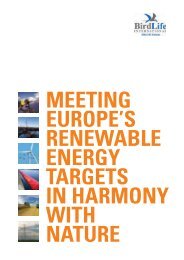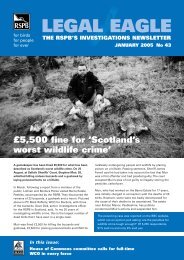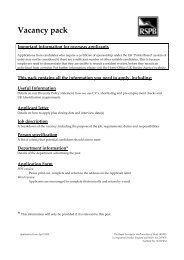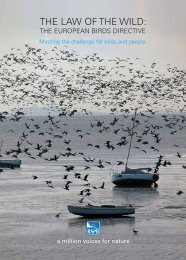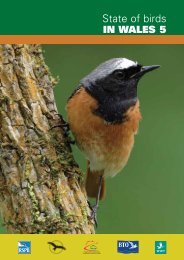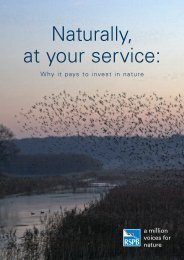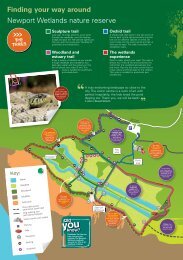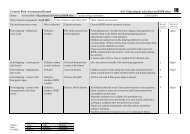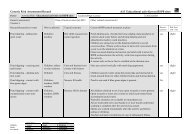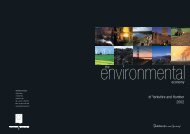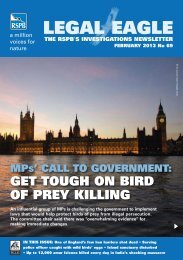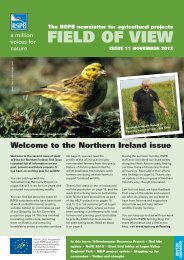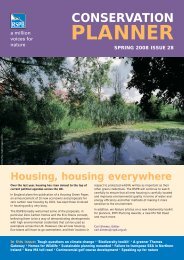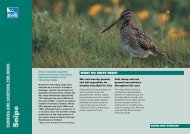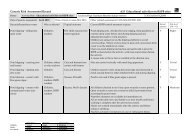annual report and accounts 2012 - RSPB
annual report and accounts 2012 - RSPB
annual report and accounts 2012 - RSPB
Create successful ePaper yourself
Turn your PDF publications into a flip-book with our unique Google optimized e-Paper software.
<strong>RSPB</strong> trustees’ <strong>report</strong> <strong>and</strong> <strong>accounts</strong> 2011-12<br />
Trustees’ <strong>report</strong><br />
Reduced carbon footprint<br />
Objective Achievement Future challenges<br />
We aim to reduce<br />
CO2 emissions by<br />
3% each year on a<br />
per staff basis.<br />
From a baseline of emitting 3.25 tonnes of CO2 per staff<br />
member in 2008, we reduced emissions to 2.39tCO2 in <strong>2012</strong>.<br />
This is significantly lower than our target of 2.88tCO2 <strong>and</strong> it<br />
represents an extraordinary achievement for the <strong>RSPB</strong>. In total,<br />
since 2008, we have saved nearly 500tCO2, despite continuing<br />
to grow. However, the rate of reduction is getting harder to<br />
maintain.<br />
Our revised target is to<br />
continue to reduce emissions<br />
on a per staff basis by 3%<br />
each year against a 2010<br />
baseline. Previous, emission<br />
reductions were principally<br />
delivered through reducing<br />
travel, behavioural change<br />
<strong>and</strong> energy efficiency. To<br />
ensure meeting this target<br />
does not threaten<br />
conservation delivery in the<br />
future, we will need to invest<br />
in renewable <strong>and</strong> energy<br />
efficient infrastructure.<br />
Whilst these investments can<br />
yield attractive returns,<br />
accessing the capital,<br />
expertise <strong>and</strong> staff time to<br />
deliver them will be a major<br />
challenge.<br />
Supporting BirdLife International Partners<br />
Objective Achievement Future challenges<br />
We will continue<br />
to help build the<br />
capacity of<br />
BirdLife<br />
International<br />
partners.<br />
The <strong>RSPB</strong> provides support to 24 BirdLife partners across the<br />
world. The combined <strong>annual</strong> income of our partners increased<br />
significantly by 19%, from £11.7 million to £14 million, partly<br />
through our support for proposal development <strong>and</strong> joint<br />
applications. Examples include:<br />
• We assisted NatureKenya to secure Department for<br />
International Development funds to develop a l<strong>and</strong>-use<br />
plan for the sustainable management of the Tana River<br />
Delta.<br />
• EU Life projects continue to be important with the largest<br />
ever grant for Egyptian vulture conservation (€3.3 million)<br />
secured for work in Bulgaria <strong>and</strong> Greece.<br />
• Important new funding for marine IBA work was secured<br />
for Malta, Turkey, Bulgaria <strong>and</strong> Romania.<br />
• We were awarded three grants from the UK Darwin<br />
initiative to support our partners work on the Bengal<br />
florican, the spoon-billed s<strong>and</strong>piper <strong>and</strong> restoration of<br />
Henderson Isl<strong>and</strong>.<br />
We must help partners<br />
generate funds for<br />
unrestricted use, rather than<br />
funds solely for specific<br />
projects. Once they become<br />
financially sustainable, we<br />
will have achieved our goal.<br />
www.rspb.org.uk 13



